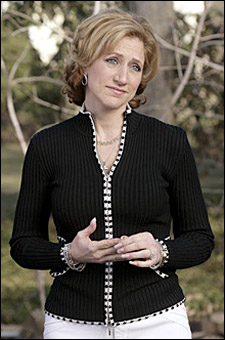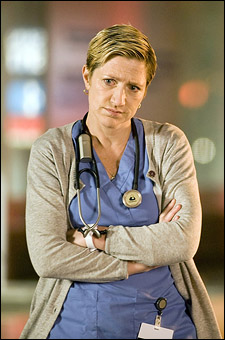
*
Although she's well aware of the dangers of Hollywood typecasting, Edie Falco never fretted about being forever pigeonholed as Carmela on "The Sopranos."
As that landmark HBO series drew to a close in 2007 after six groundbreaking seasons, Falco remained confident she would eventually be able to escape from the shadow of her indelible character — the fiery yet devoted New Joisy mob wife who she rendered with exquisite complexity and exacting detail.
Falco's portrayal of Carmela earned her a wheelbarrow full of awards, including three Emmys and two Golden Globes. So when she began considering options for her post-"Sopranos" career, she didn't dwell on viewers' perceptions of her as an actress or even carefully calculate her next move.
"I don't plan that much, to be honest with you," says Falco, 46, who has returned to the New York stage for the first time in five years in Chloe Moss' post-prison drama This Wide Night, for Naked Angels. "But I knew I had my work cut out for me, because 'Sopranos' was so exciting and fulfilling. I really wanted to find something that would be at least as challenging and really grab me again. It's a tough act to follow. So it did take a while."
After "The Sopranos" wrapped, scripts for New Jersey-set dramas about hot-tempered housewives and big Italian families poured in. "I was like, 'Really, guys? And you thought of me? I can't believe it,'" she snaps. While it was frustrating, she carefully bided her time, patiently waiting for the right project and role to materialize, one that would ideally push her into new territory and challenge her creatively. If you've seen Falco's new Showtime television series, "Nurse Jackie," you're well aware how thoroughly she's succeeded. Not only did she break the Hollywood typecasting stranglehold, she reinvented the popular perception of her as an actress.
In the half-hour comedy series, she plays an ER nurse who isn't afraid to take matters into her own hands when the bureaucratic, inefficient health care system threatens her patients — whether admonishing a doctor for a mistake, forging an organ donor card, or committing euthanasia on a dying former colleague. Jackie also has a few personal secrets rattling around in her closet: Namely, a family she keeps under wraps from her colleagues, an affair she's been carrying on with a co-worker, and most significantly, an addiction to prescription painkillers that she pops like Flintstones vitamins.
 |
||
| Edie Falco on "The Sopranos" |
||
| photo by Craig Blankenhorn/© HBO |
"I have no idea what people think about it, or if they think of me as having successfully redirected my career," she says. "But it is the challenge I'd hoped it would be, and it has activated me internally in a way that I had wanted."
Falco managed to reinvent herself anew, but she acknowledges that's much easier said than done. For her, it was all about remaining patient in looking at options for her next project while not letting casting agents and directors pigeonhole her.
"Let's say you've played a waitress. Sometimes casting people are not terribly creative, so they think, 'Oh right, Edie Falco plays a waitress!' So they'll call me, and they'll offer me the part of a waitress. The question then becomes: Can I be true to myself and say no to this and just wait 'til something different comes along? And I understand — a lot of actors can't because they need to work. But you know, it's your job to say, 'No, you know, I've played a million waitresses, and I'm not going to take this job. I'm going to wait until something comes along that's different.' And it may be a long time. But in the end, it'll be worth it."
 |
||
| Edie Falco on "Nurse Jackie" |
||
| photo by Ken Regan/© Showtime |
Falco's character, Lorraine, represents another significant departure for the actress — one that she expects will force her to stretch out as an actress. When Lorraine, newly released from the clink, shows up unannounced on the doorstep of her former cellmate, Marie (played by Alison Pill), things don't go as she expects. While the two lost souls were once intensely close inside the prison walls, outside they struggle to navigate a rekindled friendship, which may threaten their prospects of starting their lives over.
"They get out of prison and are faced with these questions: Who and what are they now? Is there a way to resume their bond after that experience? Are they friends? Family? Would this relationship have been real had it not been insisted upon in a prison? You don't really know," says Falco. "I think that's what the play is about."
The dynamics between the two characters keep shifting and changing as the play progresses. "Every sort of amalgamation of a relationship between two women is suggested — two women together as friends, sisters, mother and daughter. I think it's because the relationship defies description. So what the play tries to explore is: What are they to each other? And what have they made each other into?"
Even before she read This Wide Night, Falco had always been fascinated by prison-set documentary series like "Lock Up" and "Prison Wives" (perhaps this has something to do with playing a character on "The Sopranos" whose mobster husband was under constant threat of being sent off to the slammer). "Long before this play came along, the idea of life-in-prison was just fascinating to me. It's a whole society unto itself. So I have a lot of that stuff in my system already," she says.
Despite the hardships the characters endure, Falco marvels at their dogged determination and resilience. "These women are in a tough situation and are trying to create a new chapter of their lives," she says. "And despite incredible odds, these people still try to find their way into a life that's meaningful."
From Lorraine to Carmela to Jackie, Falco has always been drawn to complex characters with big flaws and deep psychic wounds, but whom the audience ultimately roots for despite their warts.
While Falco was attracted to Lorraine because of the character's strength and efforts to start a new chapter in her life (something Falco did after a 2004 battle with breast cancer), she says she's drawn to Jackie because of her compassion, sharp wit and dry sense of humor. ("I don't like chatty. I don't do chatty," Jackie snaps at talkative nurse trainee, Zoey. "I like quiet. Quiet and mean — those are my people.")
"She's a wise ass," says Falco. "She's a very imperfect person and is really kind of a mess. But she's also very good at what she does. She's highly competent in terms of as her intelligence and her abilities as a nurse. But there's a lot of chaos inside of her."
While Falco admits she herself has a bit of a smart-ass streak, she identifies with Jackie's darker side as well, since she's fought her own battles with addiction — something she's talked about openly. While she's been sober now for many years, she agrees that her experience with addiction has probably given her a better window into Jackie's own troubles and helped illuminate aspects of her character that might seem enigmatic to others.
"I certainly know that in conversations with people about addiction, if people haven't struggled with it or if they don't have friends or family who've struggled with it, it really makes no sense at all," says Falco. "This idea that you're drawn to something that's terrible for you defies rationale. But that's what addiction is, that's all it is: This absolutely irrational behavior, based on something internal, some psychological or physiological thing. Having struggled with that myself, I know what it feels like, and I understand it. So I imagine it has informed Nurse Jackie in some way."
Falco's experience with motherhood has also informed her character, who has a husband and two young girls at home. After the actress' battle with breast cancer in 2004, she decided she wanted to become a mother, adopting two children — Anderson, 5, and Macy, 2. She says it's changed her perspective on life.
As to where Jackie's addictions to prescription drugs and illicit sex spring from, that remains a mystery, as do her own struggles with drugs and alcohol.
"I don't think about it, to be honest with you," she says. "Just like on some level in terms of my own issues with [addiction], I don't really know where it comes from. I find it fascinating. But it would actually be a lot more fascinating if it wasn't something I myself have dealt with and people I love have dealt with, because [addiction] really can just destroy lives. From a purely outsider's point-of-view, I could spend my whole life studying it and trying to understand it and, ideally, helping people with it, because it is such a torture."
Falco marvels at the way audiences still root for Jackie and sympathize with her, despite the character's tendency towards self-destructive behavior and willful self-delusion. "I like the fact that people are, or at least seem to be, responding to the show and to her, perhaps because she is such a mess in a way," she says. "It's really encouraging that people can still attach themselves emotionally to a person who does things that are not good. It a sign that the character is really resonating."
As for how Season 2 will wrap up and what direction the character is heading for next year, Falco says she's a bit too close to Jackie to be able to paint a larger picture.
"You know, like anybody who goes through two years of their life, things evolve and they change, and the lies get a little bit bigger and more convoluted," she says. "And eventually, the life of an addict becomes unmanageable. Either that, or they die. So basically, we find ourselves in the same state of wondering which way it will go with Jackie."
Christopher Wallenberg is a freelance journalist specializing in arts and entertainment. He writes regularly for the Boston Globe, Playbill, American Theatre magazine and the Christian Science Monitor.



Evan-Zimmerman-for-MurphyMade.jpg)






